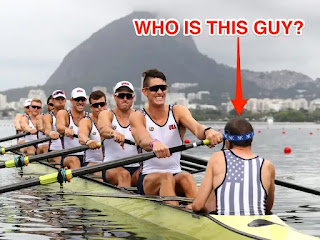I know, I know. I promised you a discussion the designated hitter. But this is important, dammit!
Oddball sports are the lifeblood of the Olympics. Every four(ish) years, otherwise reasonable people find themselves suddenly espousing passionate opinions about arcane athletic pursuits that nobody watches: Water polo! Taekwondo! Gymnastics! (Oh, bite me! You know I speak the truth!)
So it is with volleyball.
To be clear: Not women's beach volleyball, which, far from being meaningless, is the epitome of sports and should have its own cable channel devoted to showing it 24-7-365-World Without End, amen!
No, I speak of the more prosaic indoor volleyball, about which I have developed strong opinions over the last 23 minutes! Specifically, about the "libero."
If you've been watching Olympic volleyball (and who hasn't?), you've surely noticed that one player on each team wears a different color shirt than their teammates.
This is not, as one would reasonably assume, a result of a laundry snafu. Rather, the mismatched player is the "libero," a position invented in 1998 because volleyball wasn't convoluted enough.
Generally, the libero is the team's best defensive player. Not to be confused with the team's most defensive player. That would be Sheryl. You just can't say anything to that girl!
Where was I? Ah, yes:
The libero plays a very specific role. They are not allowed to serve. They are not allowed to spike. They are mainly assigned to play defense--but the defensive permission does not extend to blocking their opponent's spikes, which they are not allowed to do, but which would seem to be a key defensive function, but what do I know? I'm just the guy who's been watching volleyball for, now, 32 minutes. Anyway.
Liberos are allowed to make spectacular dives (which I believe are called "digs") to prevent a spiked ball from hitting the ground (which would be bad). They are also allowed to be the "second setter"--i.e., the person who volleys the ball after the first setter so that a third person can smack the ball over the net. The libero, then, plays the role of the middle person in the Human Centipede that is a volleyball team.
Sorry.
Now, I grant you that saving a spiked ball ("digging") is an important skill. From what I've observed, though (46 minutes!), liberos are not very successful at doing this. This phenomenon becomes more befuddling when you notice that the "spiker" very often smacks the ball right in the libero's direction. Like, "Here, libero! Dig this!" Which on the face of it seems like poor strategy if we assume the liberos can do their job. I mean, if they're ostensibly the best defensive player, wouldn't you want to keep the ball away from them? You don't see baseball players intentionally hitting the ball in the direction of the gold-glove shortstop, right?
I should really coach volleyball.
I mentioned earlier that the libero wears a different colored jersey. This is supposedly to make the player easier for the officials to identify, in case they do something useful--uh, I mean, un-libero-like, such as blocking an opponent's shot.
I suspect, though, the opportunity to clothe someone in an alternate color jersey was in fact the main impetus for the position: It was a marketing ploy. I mean, you have any idea how many volleyball groupies there are?!?
No, seriously, do you? I'm thinking six?
However many there are, you don't want them to stop buying Team USA merch! So you have to give them more inventory to choose from! You only have the standard t-shirt? Real fans will spend the extra $49.99 for the libero hoodie!

